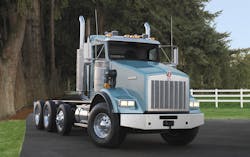Make old trucks “new” with Kenworth glider kits
Kenworth Truck Co. has released glider kits for several models to help owners who wish to bring an older truck back to “new” status. The kits, available for the T660, T800 (split fender configuration) and W900L models, are designed to be mated to customer-supplied EPA 2004 engines and matching transmissions.
All sleeper sizes are available, Kenworth said. Customers can spec the kits directly from the company.
“We’re offering the gliders as both rolling and non-rolling models (customer supplies driveline, axles, suspensions, wheels, tires and other ‘rolling’ equipment) and no FET tax is included from Kenworth,” said Alan Fennimore, vocational marketing manager. “Depending upon the project’s final cost, and if the host parts came from a useable truck, the 12% Federal Excise Tax (FET) on new trucks may not be applicable, which can be a real money saver for customers.”
According to Kenworth, FET will apply when a glider kit is used to repair a de-commissioned (wrecked) vehicle, or change its intended service (for example, tractor to a full truck), or where the restoration cost exceeds 75% of the value.
The Kenworth glider models feature the latest amenities and updates in each of the three models. The truck model year of the glider will be determined by the donor chassis, as long as two of the three major powertrain components (engine, transmission, and drive axle) are utilized from the donor chassis.
“There are several other engine-related components – such as electrical harnesses, power steering pumps, batteries and air cleaners – that customers need to supply themselves, or purchase from Paccar Parts through their local Kenworth dealerships, but for the truck itself, it’s a very complete package,” said Fennimore.
Fennimore said there is growing interest in glider kits.
“Gliders are a great alternative for fleets and owner operators with the tools and service technicians to bring a solid and existing powertrain back to life in a ‘brand new truck’,” he said. “We’ve talked with several fleets that plan to purchase gliders and have their service technicians work on the conversions during slow or off periods. It can be an effective use of shop hours.”
